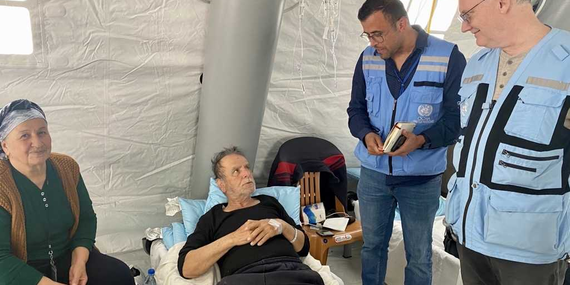Today's top news: Syria, Türkiye

Syria
Today, 35 truckloads of aid from the World Food Programme, the UN Food and Agriculture Organization, the World Health Organization and the UN Refugee Agency crossed into north-west Syria. In total, 535 crossed into north-west Syria since 9 February.
Humanitarian partners continue to provide assistance across affected areas including family food baskets and hot meals, medical supplies, hygiene kits, tents, blankets, mattresses and winter clothes.
Our humanitarian colleagues tell us the availability of basic commodities in local markets and their rising costs continue to pose a challenge.
Scale up of winterization, shelter items (tents, isolation sheets, blankets, etc), medical supplies, water, sanitation, food, cash assistance, and psychosocial support remains a priority.
Türkiye
The Resident and Humanitarian Coordinator there, Alvaro Rodriguez, travelled to Hatay today, a city almost completely wiped out by the earthquakes.
He visited a camp and a field hospital, met with communities affected by the earthquakes as well as government officials and emergency responders.
We and our partners have been providing assistance, including shelter, food and hot meals, medical assistance, water and sanitation services and psycho-social support.
The UN also have 9 Emergency Medical Teams in Hatay and another one will be established soon. Each team treats 150-200 people a day, including surgeries.
More than 60 Urban Search and Rescue teams, many UN-coordinated, has come to Hatay and rescued more than 100 people from under the rubble.
Hatay province has been the worst hit by the earthquakes. More than 30,000 buildings have been either demolished or severely damaged. Over 40 per cent of the people who lost their lives in the earthquakes were in Hatay and 25 per cent of its population had to leave their homes.
